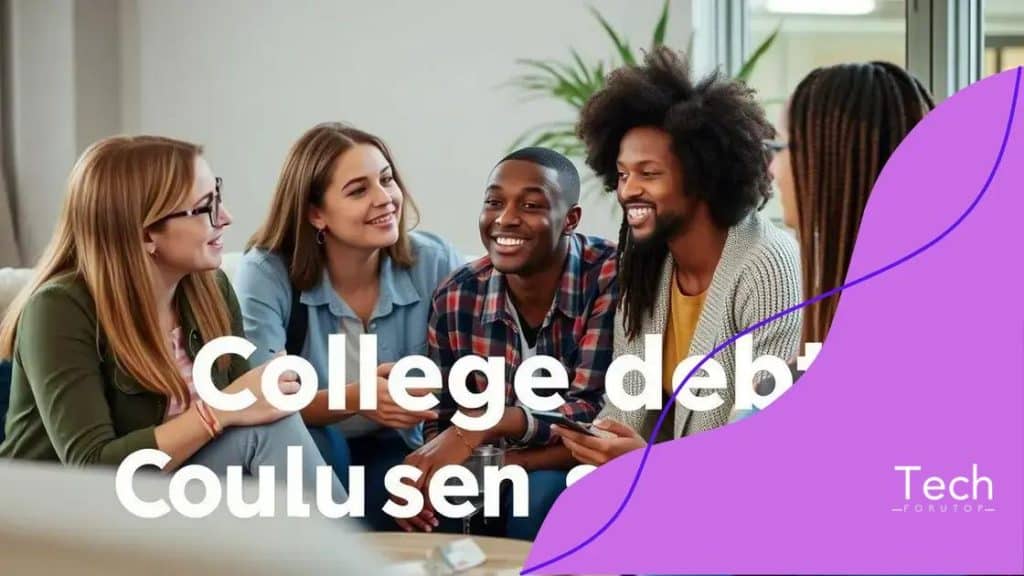College debt cancellation initiatives that can change lives

College debt cancellation initiatives aim to reduce or eliminate student loan debt, providing borrowers with financial relief and the opportunity to enhance their quality of life and economic stability.
College debt cancellation initiatives are gaining traction across the country, offering hope to countless borrowers. Have you thought about how these programs could ease your financial burden? Let’s dive into what’s available.
Understanding college debt cancellation initiatives
Understanding college debt cancellation initiatives is crucial for borrowers who are seeking relief from their student loans. These programs are designed to lighten your financial burden and make education more accessible.
What are college debt cancellation initiatives?
These initiatives aim to eliminate or reduce the student debt that borrowers owe. They can vary in scope from federal programs to state-specific measures. The government’s efforts focus on helping those in need and often come with specific eligibility requirements.
Types of debt cancellation programs
Numerous programs are available, each with different goals and outcomes. Here are a few common types:
- Income-driven repayment plans
- Public Service Loan Forgiveness
- Teacher Loan Forgiveness
- Discharge due to permanent disability
Each initiative has unique qualifications, making it essential for you to understand which one might be right for your situation. Another important point is that these programs usually require you to actively apply and provide documentation to support your eligibility.
Staying informed about college debt cancellation initiatives can help you navigate your options effectively. It’s a chance to make educated decisions about your financial future and find ways to reduce the weight of student loans.
Additionally, there are many resources available to help you learn about these programs. Websites, financial advisors, and campus services are just a few examples of where you can find valuable information.
Ultimately, understanding these initiatives is the first step in reclaiming your financial health. It empowers borrowers, making the sometimes overwhelming process of college debt more manageable.
The impact of cancellation on borrowers
The impact of cancellation on borrowers is significant and can change lives. Student loan debt can feel like a heavy weight, and when cancellation occurs, it brings a sense of relief and renewed hope.
Benefits of cancellation for borrowers
When borrowers have their debts canceled, they can experience numerous positive outcomes. These include:
- Reduced financial stress
- The ability to save for future goals
- Improved credit scores
- More opportunities for home ownership
This freedom can lead to greater financial stability and allow individuals to reallocate funds toward other essential needs. With less debt, borrowers are often happier and healthier.
Effects on lifestyle choices
Debt cancellation can open doors. Many borrowers find that they can pursue further education, travel, or even start their own businesses without the heavy burden of loan repayments looming over them.
Imagine being able to take a job that you love instead of one that pays more but feels unfulfilling. That is the power of debt cancellation. It allows individuals to follow their passions and make choices based on personal desires rather than financial necessity.
Moreover, the ripple effects of cancellation extend beyond individual borrowers. It can stimulate local economies as those who are no longer burdened by debt begin to spend more. Increased consumer spending can lead to job creation and a boost in overall economic growth.
This cycle promotes an environment where everyone flourishes, creating a positive impact on communities.
Eligibility criteria for debt cancellation programs

Understanding the eligibility criteria for debt cancellation programs is key for borrowers seeking relief from student loans. Each program has specific requirements that determine who can benefit from these valuable initiatives.
General requirements for loan cancellation
While criteria may vary, many programs share common conditions. Borrowers typically need to meet these basic requirements:
- Proof of financial hardship
- Enrollment in an eligible education program
- Length of time in repayment
- Employment in a qualifying job, where applicable
These factors can affect eligibility, making it essential to carefully review each program’s guidelines.
Special considerations
Some debt cancellation programs may have unique criteria that applicants need to be aware of. For example, certain programs offer cancellation specifically for:
- Teachers working in low-income schools
- Public service employees
- Health care workers in underserved areas
Understanding these special conditions can help borrowers know if they qualify. It’s also important to remember that some programs might require a specific number of years in service before any debt cancellation occurs.
Moreover, documentation plays an essential role in the application process. Borrowers must gather necessary paperwork to support their eligibility claims. This can include tax returns, loan statements, and proof of income.
Lastly, staying informed about any changes in these criteria is vital as policies can shift over time. Keeping up with updates ensures that borrowers can take advantage of the opportunities available to them.
How to apply for debt cancellation
Learning how to apply for debt cancellation is a vital step for borrowers looking to reduce their student loans. The process can seem daunting at first, but with clear guidance, it becomes manageable.
Step-by-step application process
To begin, borrowers should gather essential documents. This includes proof of income, tax returns, and any relevant loan information. Having these documents ready will streamline the application process.
Filling out the application
Next, you’ll need to complete the specific application form for the debt cancellation program you are interested in. Each program may have a different form, so it’s important to access the correct one on the official website.
- Verify eligibility criteria before applying.
- Fill out the application accurately, ensuring all information is correct.
- Attach necessary documentation to support your claims.
Once you have submitted your application, it’s essential to monitor its status. Many programs offer an online portal where you can track your application progress.
Be prepared for potential follow-up requests for additional information. Staying proactive by checking in can help avoid unnecessary delays in the cancellation process.
What to expect after applying
After submitting your application, you may experience a waiting period. This can vary depending on the program and your situation. During this time, it’s important to remain patient.
If your application is approved, you will receive a confirmation. Keep this document as it acts as proof of your loan cancellation. If your application is denied, you have the right to request a review or appeal the decision. Understanding your options is crucial for moving forward.
Success stories from debt cancellation initiatives
Listening to success stories from debt cancellation initiatives can inspire hope and motivation for many borrowers. These stories highlight how people’s lives have changed for the better once their debt was canceled.
Personal transformations
Many individuals report feeling an incredible sense of relief after their loans were forgiven. For instance, one borrower shared that she could finally buy a home after years of being burdened by her student loans. Without the stress of monthly payments, she was able to save for a down payment.
Career shifts and opportunities
In some cases, cancellation has allowed borrowers to pursue careers they are passionate about instead of staying in jobs solely to pay off debt. For example, a teacher who received forgiveness through a federal program was able to continue her work in a low-income school, focusing on her students rather than worrying about financial strain.
- Community engagement: Many success stories also include increased community involvement.
- Financial freedom: Borrowers often express gratitude for the financial freedom that comes with cancellation.
- Better mental health: Reducing debt significantly impacts mental well-being.
Moreover, these stories serve as a testament to the overall benefits of debt cancellation. Borrowers not only regain financial control but also help boost local economies by spending more on goods and services.
Families can take vacations, invest in education, or even start new businesses—proving that canceled debt translates into opportunities for personal growth and community development.
FAQ – Frequently Asked Questions about College Debt Cancellation Initiatives
What are college debt cancellation initiatives?
These initiatives are programs designed to help borrowers reduce or eliminate their student loan debt, providing financial relief and opportunities for personal growth.
How can I apply for debt cancellation?
To apply, gather necessary documents like proof of income, fill out the appropriate application form, and submit it with supporting documents.
Who is eligible for debt cancellation?
Eligibility varies by program but generally includes factors like income, employment in qualifying roles, and length of time in repayment.
What are the benefits of debt cancellation?
Benefits include reduced financial stress, improved credit scores, and the ability to pursue better job opportunities, leading to a stronger economy.





